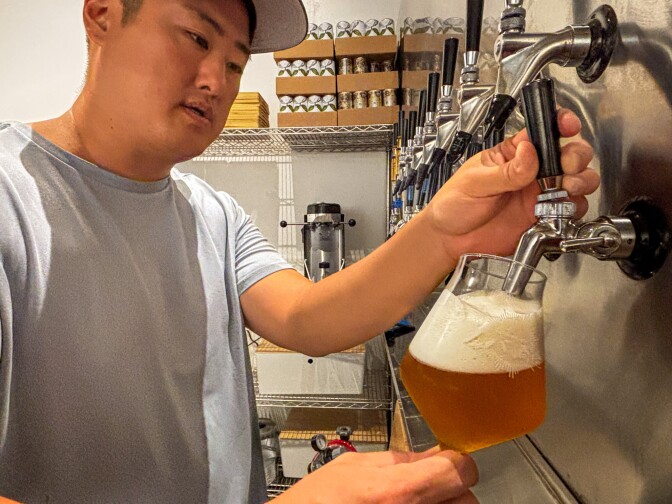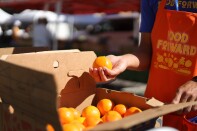This story is free to read because readers choose to support LAist. If you find value in independent local reporting, make a donation to power our newsroom today.
Japanese flavors are having a moment in LA’s craft beer scene

Yuzu, matcha, shiso — you’ve likely had them at a Japanese restaurant. But how about in a beer?
A handful of independent breweries here in Los Angeles are pushing creative boundaries, blending European beer-making methods with Japanese ingredients, resulting in some truly remarkable creations.
Like a tart matcha wheat beer crafted by a medical researcher with a Ph.D. Or a Belgian-style tripel brewed with sake yeast in a Covina business park. It all fits right in with the region's emphasis on embracing new and cutting-edge beer styles.
It's notable that the experimentation with Japanese ingredients is happening here, not Japan. That's because the Japanese craft beer scene, while burgeoning, is still small compared with its U.S. counterpart. (It’s only been in existence for about 30 years, after a change in local microbrewing laws). So it's still got a fair way to go to catch up.
Here are some of the SoCal breweries marching to their own, Japanese-inspired drums.
n/Soto and Cellador Ales
Alex Ourieff, owner of Cellador Ales in Torrance, specializes in farmhouse ales, a brewing method traditionally used by European farmers.
Today, that style means using ingredients sourced from local farmers, fermented inside wine barrels with a blend of yeasts and bacteria to create distinct flavors. Ourieff’s beers tend to be more sour, but they also have floral and fruit-forward notes, which add depth and make each batch always enjoyable.
After forming a relationship with n/soto, a casual upscale Japanese restaurant located in West Adams, Ourieff and n/soto general manager Mark Nechols decided to collaborate on a beer.
The vision was to create something that would complement the restaurant’s izakaya-style menu, a Japanese version of bar bites, which features everything from grilled skewers to crispy tempura.
The beer, n/soto x Cellador Tart Wheat Ale, uses one of Cellador Ales' Belgian-style witbiers (a wheat beer) as its foundation, known for its creamy mouthfeel and golden appearance due to its unfiltered brewing process.
It's then combined with yuzu, the Asian citrus fruit; sansho, a green peppercorn known for its subtle numbing heat; shiso, an aromatic herb that’s part of the mint family, locally grown at Yasutomi Farms in Pico Rivera; and ginger, sourced from Her Produce in Fresno.
Finally, the beer is naturally carbonated with local honey.
Nechols says he wanted to challenge the stereotype that traditional Japanese beers are pale, crisp, and easy to drink, like those offered by Sapporo, Kirin Ichiban, and Asahi. (Those are not sold at n/soto by the way.)

“ I think we made a beer that has good drinkability using only local products, and that’s along the lines of what I was thinking with this collaboration,” Nichols said.
When I tried the beer recently, it was tart and slightly funky, underscored by subtle herbaceous flavors. The added ingredients complemented the light, wheat-based style of beer that I already enjoy, and its subtlety made sense in a Japanese restaurant.
The beer is currently available only at the West Adams restaurant, with plans to keep it in rotation for the foreseeable future.
Where to find:
Beer: n/soto x Cellador Tart Wheat Ale
Location: n/soto, 4566 W. Washington Blvd., Los Angeles
Hours: Wednesday through Friday, 5 to 9:30 p.m. Saturday and Sunday, 5:30 to 9:30 p.m.
Ikasu brewing
Located inside the Native Son tap room in downtown Los Angeles, you can find Ikasu Brewing, and owner Masahiro Kitano, who goes by Masa. Kitano has the look of a mad scientist, with messy hair and wild eyes behind his glasses, perhaps because that's not too far from the truth.
After earning his Ph.D. in medical science from Osaka University in Japan, he came to Los Angeles to begin a post-doc fellowship, initially at Cal Tech and later at USC, studying cancer biology.

During that time, a fellow post-doc introduced him to the concept of home brewing. He started experimenting and eventually joined the local homebrew organization SoCal Cerveceros, where he began entering his creations in contests — and winning.
That’s when he got the idea to start Ikasu, a name that’s slang for something that’s cool and in the moment, aimed at creating one-of-a-kind beers that showcased Japanese ingredients.
“There are so many unique Japanese ingredients that never show up in beer, and I wanted to experiment with that,” Kitano said.
For his first, now flagship beer, called LArigato (‘arigato’ means thank you in Japanese), he wanted to produce a rice lager, the most common type of beer found in Japanese brewing, which uses rice instead of malt barley.
For his creation, he bought Japanese rice grown in California and ground it into a rice powder to create what he felt was a fuller-bodied flavor and softer mouth feel.
He also made a variety of other malt-based beers, like Goma Me (‘goma’ means sesame in Japanese), a dark, porter-style beer made with black sesame seeds. It combines roasted flavors with a hint of umami, similar to the taste of black sesame seed ice cream.
“ Usually, umami is an off flavor in beer, but if it's intentional, it gives a different story,” Kitano said.
Those roasted umami flavors really came through when I tried it, complementing the creamy texture of this beer style, making it a great alternative for when you get sick of drinking Guinness.
His most experimental beer is the Matcha Tart, inspired by the sour German tart wheat beer known as a gose, which is renowned for its unique blend of salty, sour and refreshing flavors.
Kitano himself describes the addition of matcha as a “super weird combination,” and it certainly was that.
I could taste the notes of matcha’s earthy flavors, along with a savory umami undertone and just a hint of tartness. I’m personally not a big matcha drinker (I prefer coffee), so it’s not something I would order regularly. Still, I appreciated the lengths Kitano is willing to go to create something completely original.
Finally, I also sampled the Yuzuko Show, a saison, a Belgian-style farmhouse ale. Kitano makes it with a fermented mixture of chili pepper, yuzu peels and salt. I could definitely taste the black pepper and citrus; I suggested to him it could be a a perfect base for a michelada.
Kitano now has six beers on rotation at Native Son, as well as kegs at a few select locations around L.A.
Where to find: Ikasu Brewing beers
Main location: Native Son taproom, 832 S. Olive St., Los Angeles
Hours: Monday through Friday, 2:30 to 10 p.m. Saturday and Sunday, 11 a.m. to 10 p.m.
Also available at: Shirubē Santa Monica (Santa Monica), Mazal (NELA), Melody Lounge (Chinatown), Philippe The Original (near Union Station) and The Douglas (Echo Park).
Nova Brewing Company
Way east of Los Angeles, in Covina, is Nova Brewing Company, a small three-person operation. It’s led by James Jin, who is the head brewer and co-owns the brewery with his wife, Emiko.
Jin, who is Korean-American, grew up in Southern California and attended UCLA, where he studied Japanese. After graduating, he participated in an exchange program in Japan and traveled back several times, teaching English. He then moved to Thailand for four years before running out of money and returning home.
He took a job at Mutual Trading, a Japanese importing business, where he met Emiko, who is Japanese, while they were both taking a sake sommelier course.
Growing up, Jin said he’d always had a strong interest in both Japanese culture and craft beer. In 2019, he completed two apprenticeships at prominent breweries in Japan, Inaba Brewery and Kiuchi Brewery, which produce both craft beer and sake. There, Jin learned the ins and outs of brewing both.

“I’m serious about sake, but I love being playful with beer,” Jin said.
Later that year, he and Emiko took over an older brewery space in Covina and began making their own beverages. They now have seven craft beers and five sakes, with Emiko overseeing the financials.
Jin focuses on creating a product that’s as natural as possible, even down to the water, which goes through a two-part filtration system before it gets added to his beer and sake.
While many craft beers today are heavy on hops, Jin prefers to go in a different direction, playing with the level of malt for a smoother flavor profile and using hops sparingly to include only a hint of bitterness.

Jin’s two signature beers, part of his Ginjo 7 series, are two blonde ales, both brewed with sake yeast. The white label blonde is light and crisp due to the addition of steamed rice, while the blue label contains wheat and oats, giving it a creamier mouthfeel. Both had floral notes from the sake and went down easily.
Another beer, the Oolong Island, features roasted oolong and yellow peach, providing a perfect amount of sweetness balanced with a slight nutty note. The name itself is a play on the Long Island iced tea cocktail, as an homage to its combination of flavors.
While Jin is happily at home in his Covina location, he eventually hopes to move the business closer to Los Angeles and build a large facility devoted to craft beer and sake. For now, he’s renovating his current space for those willing to make the trip to taste his unique creations.
You can also get his beers at a couple of different outlets.
Where to find: Nova Brewing Company beers
Main location: 1580 W. San Bernardino Road, Unit H, Covina
Hours: Friday, 5 to 9 p.m. Saturday through Sunday, noon to 8 p.m.
Also available at: Mitsuwa Marketplace, Total Wine













